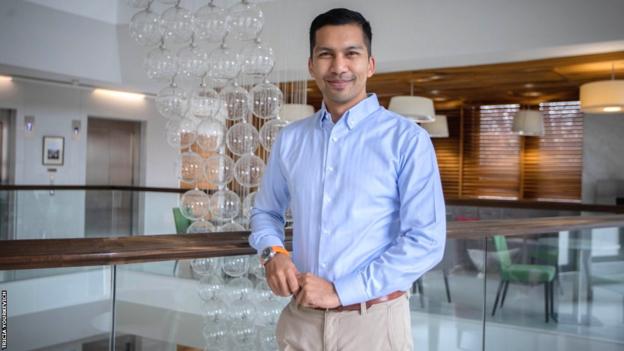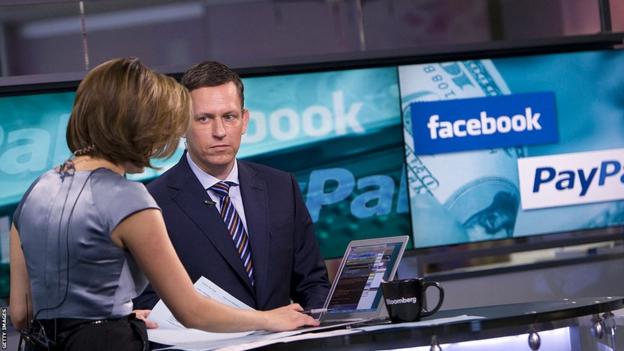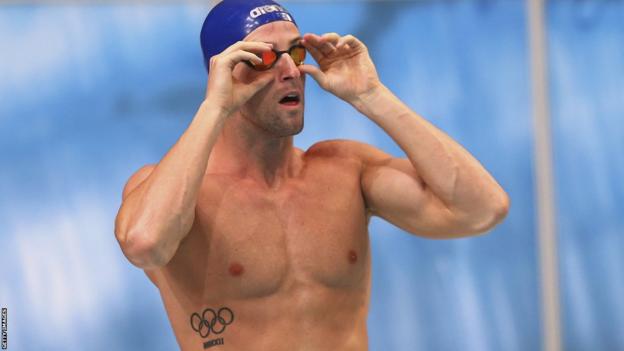Sports
Enhanced Games: The mind behind the ‘doped Olympics’



Move fast and break things.
In the early years of the new millennium, as Mark Zuckerberg was turning Facebook from dorm room hustle into a ground-breaking billion-dollar company, he adopted a motto.
He told colleagues to act first and apologise later. Old orthodoxies should be shattered, rivals dented and establishment egos bruised in pursuit of a project that justified it all.
It became the disrupter’s mantra, a philosophy that could turn a bright idea into a glittering fortune in a twinkle.
Now, Aron D’Souza is making the same offer to the world’s best athletes.
The Enhanced Games has put million-dollar bounties on world records: move fast, break records and you can earn big.
The catch that has hooked headlines around the world is that competitors can use performance-enhancing drugs to do so.
The Enhanced Games, which plans its first edition for 2025, will have no drug testing. It will be a pharmaceutical free-for-all, with participants free to pump, juice and dope however they see fit.
Plenty say it shouldn’t happen.
Travis Tygart, the chief executive of the United States Anti-Doping Agency, has called it “a dangerous clown show”. Two-time Olympic champion Kieran Perkins said it was “borderline criminal”. World Athletics president Lord Coe was uncharacteristically (and unrepeatably) blunt when asked his opinion.
Others say that it won’t happen anyway, that the logistics and legalities are insurmountable. They believe the Enhanced Games is a provocation or a publicity stunt, rather than a realistic prospect.
But D’Souza is adamant.
“It will happen,” says the Enhanced Games founder.
“I wouldn’t dedicate my life, years of my team’s lives and millions of dollars from the world’s greatest investors unless we truly believe we can deliver the event, break world records and fundamentally change the trajectory of not just sport, but humanity as a whole.
“We are doing something truly extraordinary, something that is shaping the future.”
It is an audacious pitch. But it isn’t De Souza’s first.

In 2009 the Australian was a 24-year-old law student, newly arrived at Oxford University. He already had a couple of degrees. What Oxford could offer, though, was connections.
“I love Oxford very deeply,” says D’Souza. “I met billionaires, CEOs and heads of state there, by the drove.”
One of the first, and most significant, was Peter Thiel. The American billionaire and founder of digital payments giant Paypal was visiting Oxford to give a talk. Afterwards Thiel toured the university’s colleges and D’Souza joined him.
As their conversation progressed, D’Souza asked Thiel what his greatest current challenge was.
Thiel didn’t talk about business, but a more personal concern. Gawker, a website that specialised in celebrity gossip, had written an article outing him, without his consent, as gay.
Thiel explained that he had considered suing, but didn’t want to draw more attention to the site and its story.
Another option was to buy Gawker, get rid of the people responsible and change its ethos. However, to do so would reward its owners with a fat pay-off.
D’Souza listened and politely suggest a third option. Could Thiel instead secretly fund someone else’s legal case against Gawker?
“I said ‘Why don’t you have a proxy war?’,” says D’Souza. “He had never thought of that. I said I had to do some research, figure out the legality and mechanics and next time he was over we could have a coffee and talk about it.”
A few weeks later, in a high-end restaurant in Berlin, D’Souza, still very much a student, laid out his plan. To find a case, build a legal team, and sue Gawker into bankruptcy would take five years and 10 million dollars. Thiel had only one question.
“Peter said, ‘That’ll be great. Where do I wire the money?’ That was it,” remembers D’Souza.
“That changed everything in my life.”
D’Souza duly delivered.
In March 2016 former wrestler Hulk Hogan won $115m (£79m) in damages from Gawker after they published a video of him having sex with a friend’s wife.
Gawker, torpedoed by the judgement, shut down five months later.
Behind it all, secretly pulling the strings and opening the purse, were D’Souza and Thiel.
Their partnership has continued through other ventures and now the Enhanced Games.
Thiel was the star name in the Enhanced Games’ January announcement of a trio of big-tech investors.
There is a financial logic to Thiel’s backing.
New money has shaken sport in the past few years. A World Cup in Qatar, Saudi Arabia-backed LIV Golf’s spectacular splitting of a sport, the abortive launch of the European Super League and the continuing rise in broadcasting rights prices were all on D’Souza’s mind as he locked himself away in a Miami penthouse in December 2022 to draw up a business plan.
But, for Thiel, the appeal of the Enhanced Games is deeper.
The 56-year-old has long held libertarian views, suspicious of restrictions on individual freedoms. He has previously explored the idea of a creating a new floating city in international waters, outside the jurisdiction of any nation state.
More recently, like several Silicon Valley tycoons, he has focused on longevity, funding research into anti-ageing technology and signing himself up to be cryogenically frozen.
The Enhanced Games chimes with both passions.
“Peter is very invested,” says D’Souza.
“He invests in 100-300 companies a year, managing tens of billions of dollars of assets across many different asset classes and funds, but most of them are just boring.
“This inspires discussion and engagement and is so aligned with what he wants to achieve – he wants to cure ageing.
“The Enhanced Games can turn humans into superhumans. It sounds like science fiction but this new kind of superhumanity is possible within our lifetime.
“On a fundamental, philosophical level we have the ability to overcome the weakness of our feeble biological forms and become something more.”
So far, D’Souza has one athlete – former Australian world champion swimmer James Magnussen – signed up to dive into the petri dish.

D’Souza hopes to recruit more high-profile names after the Paris Olympics in August, with fields in athletics, swimming, weightlifting, gymnastics and combat sports filled out by hopefuls who will initially audition by uploading footage of themselves going through drills.
Two factors mean his enthusiasm isn’t replicated everywhere.
The first is fairness.
Anti-doping regulations aim to ensure every athlete is playing within the same rules. If they work, an athlete’s performance is the product of their own hard work, tactics and talent, rather than the substances they have access to.
D’Souza contests that the ideal doesn’t match up to reality. He says the drug-testing system is already broken beyond repair. To his mind, half the field are doping, the other half are dopes if they don’t realise.
He cites a study which anonymously surveyed athletes at the 2011 World Championships. The results suggested that 44% of those involved had used a banned substance in the previous year.
Other studies, including one that retrospectively tested blood samples from the same event, have concluded that doping is less prevalent.
Then, most importantly and contentiously, there is athlete safety.
D’Souza predicts that athletes, able to openly seek performance-enhancing drugs, rather than buy them from shady, illicit sources, will actually be safer at the Enhanced Games.
Medical advice and monitoring will be on hand to pick up any danger signs in an athlete’s system. Everything will be in the open as opposed to current cloak-and-syringe scenario.
“Part of our liberation is the liberation of information,” explains D’Souza.
But,what about when that information boils down to a stark, inescapable choice: that intensive drug use will increase your chances of short-term sporting success, but also endanger your long-term health? Do you join that race to risk the most?
D’Souza has created the question, but insists the answer is entirely with the athlete.
“Bodily autonomy is a fundamental human right. Adults with free, informed consent should be able to do with their body what they wish,” he says.
“Individuals should be able to make risk decisions for themselves.”
The examples come thick and fast. D’Souza cites his own decision to cycle in London, but not ride a motorbike. Or the decision to take a Covid-19 vaccine with a small chance of a side effect. Or to continue Nasa’s space programme after the launchpad deaths of three astronauts on Apollo One.
Whether a cash prize and being a pioneering test case for biohacking scientists is incentive enough for athletes to bury their own doubts, sign waivers and commit to competing at the Enhanced Games will be borne out over the next year.
If they do and if the worst happens, D’Souza has already considered his response.
“It will always be a tragedy if something does go wrong,” he says.
“It is something that we will reflect on and always try and improve upon, but we will recognise that there is intrinsic risk in all human actions.”
In the end, it comes back to the start.
Move fast, break things.
Previously on Insight
Sports
Rafael Nadal beats Zizou Bergs to advance at Italian Open

Rafael Nadal continued his French Open preparation by fighting back from a set down to beat Belgian qualifier Zizou Bergs in the opening round of the Italian Open in Rome.
The former world number one, a 10-time champion in the Italian capital, won 4-6 6-3 6-4.
Nadal, 37, has indicated he plans to retire after the 2024 season.
Although not at his best, the Spaniard said he “found a way to win” on his favoured clay surface as he builds up to what is expected to be his final appearance at the French Open later this month.
“My game is more unpredictable than before, I haven’t played much tennis for two years but I think I can do better than that,” Nadal added.
Having made his return from a three-month injury absence at the Barcelona Open in April, Nadal reached the last 16 of the Madrid Open last week before falling to Czech player Jiri Lehecka.
In Italy, Nadal got off to a tough start on the surface he has so long favoured.
The 22-time Grand Slam champion broke for 3-1 in the opening set but Bergs, ranked 108 in the world, immediately cancelled out the advantage before a double fault gifted the 24-year-old the break and he served out the set.
But, after a medical emergency in the crowd halted play one game into the second set, Nadal looked much more comfortable.
He quickly raced to a 3-0 lead and this time kept his composure, unleashing a forehand winner and fist pumping towards the crowd as he levelled the match.
Nadal once again broke early in the third set before overturning a 40-0 deficit and saving three break points to move 4-2 ahead.
A powerful forehand winner eventually secured the win and booked Nadal’s place in the second round, where he will face Polish world number nine Hubert Hurkacz.
“I have Roland Garros in just two weeks and a half,” said Nadal. “I need to prove myself if I am able to push my body to the limit, I need to push to feel myself ready for what’s coming.
“I am not talking only about Roland Garros. I am talking about the next match. I need to lose this fear. Matches like today help.
“Some moments I was moving faster. Some moments not. I need to get used to that, to take that risk. I feel more ready to try it than before.”
Britain’s Jack Draper also made it through to the second round with a 7-5 6-1 win against Croatia’s Borna Coric.
Draper served eight aces and did not face any break points as he also hit 22 winners in the win to set up a second round match against defending champion Daniil Medvedev.
Fellow Briton Dan Evans faces Italian Fabio Fognini in Rome.
Sports
Everton takeover: Sean Dyche says uncertainty over deal makes planning difficult

Everton boss Sean Dyche says planning for next season is difficult due to the uncertainty over the club’s takeover.
Miami-based investment group 777 agreed to buy a 94% stake in the club in September 2023 but the deal is yet to be ratified.
The Premier League have set four conditions to green light the deal but 777 has suffered financial strife in the past month that has threatened the takeover.
“Ever since I got here I have been trying to manage a situation when the goalposts move significantly at any given time,” said Dyche.
“That’s the shifting sands at this football club, currently. I’ve said many times you want to put a base into the football club to build from and it’s not quite there yet.”
Everton were docked a total of eight points by the Premier League this season following breaches of the division’s profit and sustainability rules (PSR).
The Toffees were initially hit with a 10-point deduction for the first charge but that was reduced to six on appeal, while their appeal for the second four-point charge is set to be heard within the next fortnight.
Everton secured their Premier League status with a 1-0 win against Brentford on 27 April, which provided some much-needed certainty at the club as Dyche looks head to the summer transfer window.
Dyche confirmed the club are assessing transfer targets ahead of the window opening, while owner Farhad Moshiri can sign off contract renewals before any prospective takeover is completed.
“We’re having to manage different situations the best we can,” he said.
Dyche said the club must “keep moving forward” regardless of off-field issues.
Everton host Sheffield United on Saturday in their final home game of the season, before travelling to Arsenal on the last day on 19 May.
Sports
Finn Russell: Scotland fly-half returns from injury to start for Bath

Scotland fly-half Finn Russell will start for Bath against Newcastle on Friday after recovering from a “significant” groin problem which has kept him out for the past five weeks.
The 31-year-old sustained the injury during Bath’s Investec Champions Cup defeat by Exeter on 6 April.
Russell will start for Bath at number 10 alongside Ben Spencer at scrum-half when the team travels to bottom-of-the-league Falcons, for the first of their final two regular-season Premiership matches.
Bath are third in the table, one point behind Saracens in second and five points off leaders Northampton, as they aim to secure a top-four spot and place in the play-offs.
Russell’s Scotland team-mate Cameron Redpath will also start in the centre for the first time since recovering from an ankle ligament injury.
Props Tom Dunn and Thomas du Toit also come into the front row, to complete four changes to Bath’s starting XV from the defeat by Saracens in their last outing.
-

 African History3 months ago
African History3 months agoBlack History Facts I had to Learn on My Own pt.6 📜
-

 African History4 years ago
African History4 years agoA Closer Look: Afro-Mexicans 🇲🇽
-

 African History1 year ago
African History1 year agoPROOF AFRICAN AMERICANS AIN'T FROM AFRICA DOCUMENTED EVIDENCE
-

 African History2 years ago
African History2 years agoHow Did Normal Medieval People Survive Winter? | Tudor Monastery Farm | Chronicle
-

 African History3 years ago
African History3 years agoThe Entire History of Africa in Under 10 Minutes – Documentary
-

 African History3 years ago
African History3 years agoWhat happened to the many African Kingdoms? History of Africa 1500-1800 Documentary 1/6
-

 African History2 years ago
African History2 years agoAFRO MEXICO: Black History In Mexico!
-

 African History1 year ago
African History1 year agoA Black African King in Medieval European Art























